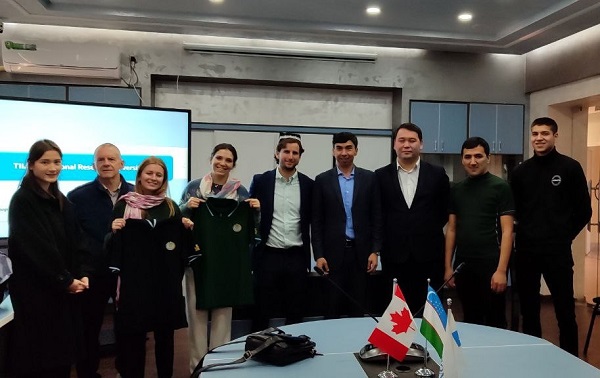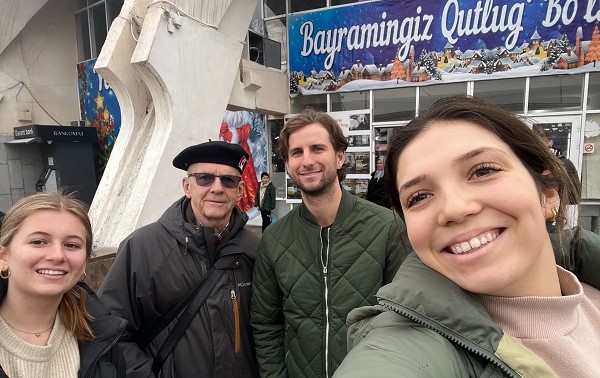HBA students Sophie Fiala and Lauren Nunes, along with MBA student Jonathan Soriano, are the current Executive Directors of the Ivey LEADER Project, a student-led international economic development program. The trio recently travelled to Tashkent, Uzbekistan to explore a potential partnership between LEADER and the Tashkent Institute of Irrigation and Agricultural Mechanization Engineers. In their blog below, Fiala and Nunes share highlights from the experience and their process for determining Tashkent’s fit with LEADER.
What brought us to Uzbekistan?
Since 1991, LEADER has operated in emerging economies around the world, teaching local entrepreneurs fundamental business skills through the Ivey case method. Entrepreneurs are taught by HBA and MBA students with a goal to provide a toolkit of management skills that will allow them to scale and grow their businesses. LEADER currently operates in five sites – Skopje, North Macedonia; Belgrade, Serbia; Pokhara, Nepal; Bangalore India; and Ho Chi Minh City, Vietnam – and is in the process of opening a sixth site. We, along with fellow LEADER Executive Director Jonathan Soriano, travelled to Tashkent, Uzbekistan in mid-January to visit Uzbekistan’s top-ranked university, Tashkent Institute of Irrigation and Agricultural Mechanization Engineers (TIIAME), and assess whether it is a good fit for LEADER.
Insights on Uzbekistan’s entrepreneurial ecosystem
Before visiting Tashkent, we were in touch with Peter McCann, MBA ’88, a TIIAME Advisor, who told us entrepreneurship is a fast-growing industry there. In recent years, there has been significant investment and emphasis on innovation under Uzbekistan’s new president, Shavkat Mirziyoyev. We had meetings with startup incubators, a venture capital fund, university leadership, and startup owners, and expected these meetings to reflect their enthusiasm on this growth. We were positively surprised with the strength of Uzbekistan’s entrepreneurial ecosystem. We were especially impressed by the accessibility of capital and how women are encouraged to enter the startup field, in a heavily male-dominated business environment.
Key takeaways on entrepreneurship in Tashkent
1. Entrepreneurs need space to grow
Following a discussion with tech entrepreneur Diyor Latipov, founder of the coding educational startup, Unicode, we learned the main barrier Uzbek entrepreneurs face is the lack of room to grow. The demand for high-tech startups is growing, but limited, and the country suffers from a brain drain as entrepreneurs look to move their businesses to faster-growing, more developed markets, such as Russia and Kazakhstan;
2. Young entrepreneurs embrace risk
We learned in our discussions with locals that Uzbek youth are more willing than previous generations to try entrepreneurship and take on the associated risk. This has evolved as more time passes since the fall of the Soviet Union, when a culture of fear of accountability was instilled in many of the country’s older generations. Improved access to capital through foreign and government-backed venture funds is also enabling youth to pursue their dreams; and,
3. Entrepreneurship education is in demand
While in past years lack of funding was the main pain point for entrepreneurs, as capital has become available, Uzbek entrepreneurs are needing support in the pre-seed, business development phases of their startups. This is a good fit for LEADER to provide support by sharing tangible business knowledge and encouraging promising business owners to pursue scaling to reach markets beyond Tashkent’s local one.
Cross-cultural learning
In addition to our meetings, we were lucky to have some time to explore Tashkent and immerse ourselves in Uzbek culture. Tashkent is a beautiful city, with ancient mosques and welcoming people. Only a small percentage of people in Tashkent speak English, and, as travellers, we didn’t have cell phone service outside of places that have Wi-Fi. This caused a few navigational challenges for us, such as some interesting dinner orders as a result of the language barrier, but we were still able to connect with and experience the warmth and generosity of the Uzbek people.
The country of Uzbekistan and its culture are very different from Canada. We learned to be open-minded and patient, and how to communicate and get around despite significant socio-cultural barriers. As we head into the business world post-Ivey, we will remember the kindness of the people we met and the lessons learned in Tashkent.
Photos below: (Top) Ivey students with representatives from TIIAME; (Bottom) Ivey students with Peter McCann, MBA ’88





